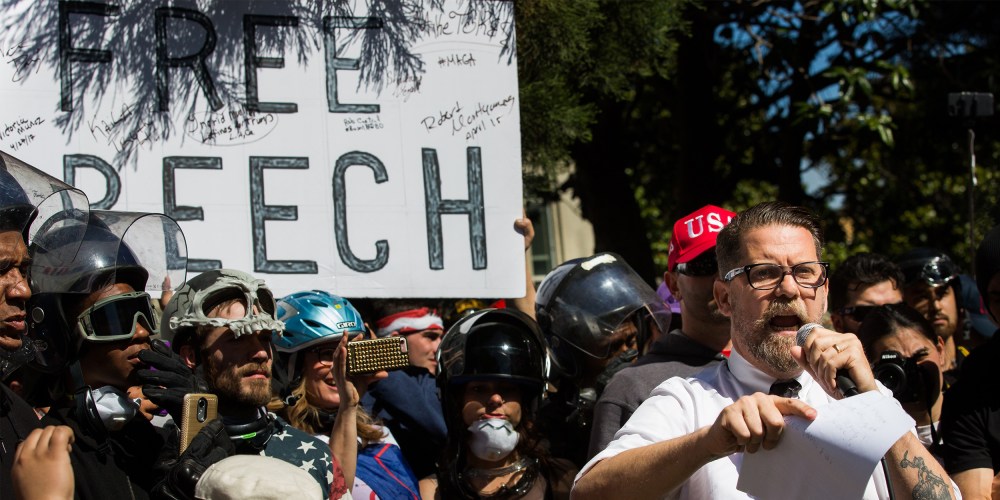Penn State University canceled a speaking appearance by Proud Boys founder Gavin McInnes on Monday shortly before the event was scheduled to begin “because campus police were concerned about escalating violence and public safety.” Students who’d gathered to protest McInnes’ appearance say the Proud Boys, a group that engages in political street violence, sprayed pepper spray at them. McIness, who has previously distanced himself from the group he founded, blamed the protesters. A statement from Penn State President Neeli Bendapudi says it’s “unclear which individuals onsite…resorted to physical confrontation and to using pepper spray against others in the crowd, including against police officers.”
Universities struggle with decisions about controversial speakers because of their commitment to academic freedom.
Universities struggle with decisions about controversial speakers because of their strong commitment to the First Amendment and academic freedom. But accommodating individuals and groups who have a history of promoting hate and violence is a mistake, and it’s long past time that university officials stop letting the far right use their campuses as a bully pulpit for hate.
The Proud Boys is a men’s only, self-described “Western chauvinist” group. In Canada, the far-right group is listed as a terrorist entity and a “neo-fascist” organization, and it’s listed as a terrorist organization by New Zealand, which has made it a crime to support or join the Proud Boys. Several dozen members have been indicted for January 6, 2021 offenses, and its former chairman is among those members charged with seditious conspiracy for the attack on the U.S. Capitol.
A student group invited McInnes to participate with other speakers in a “politically provocative” comedy night, and even as it acknowledged the “vitriolic and hateful language” used by the speakers, Penn State said it would allow the event to show its commitment to free speech. But by allowing McInnes to visit, Penn State played right into the hands of the far-right’s long-term strategy of using college appearances to platform hateful and extreme ideas, foment polarization, recruit new members and prompt violent backlash.

The strategy dates back more than half a century, to 1966 when the founder of the American Nazi Party spoke at Brown University amid tremendous protest. More recently, in 2017, Milo Yiannopoulos, the far-right provocateur and former Breitbart editor known for openly racist, Islamophobic and misogynist statements, launched a tour of college campuses that included planned speeches with titles including “10 Things I Hate about Mexico.”
The next year, after violent clashes at Michigan State University, white supremacist and “alt right” founder Richard Spencer canceled his “Danger Zone Tour” of U.S. universities. Spencer, who has been banned for five years from the United Kingdom and 26 European countries for his white-supremacist views, intended to recruit followers, challenge university free-speech practices and provoke campus communities with arguments about the need to protect white people from white oppression.
Allowing hateful visitors to appear on campus has substantial costs, including financial ones. The University of Florida spent half a million dollars on security for an event where Spencer appeared before he was eventually heckled off the stage. In 2017, the University of California, Berkeley spent $800,000 on security for a campus visit by anti-immigrant speaker and author Ann Coulter, which she canceled at the last minute.
Allowing hateful visitors to appear on campus has substantial costs, including financial ones.
After a pandemic-related pause, far-right provocateurs are back on the campus speaker circuit and once again thrusting issues of free speech, hate speech, and academic freedom into the national spotlight. Last month, student protesters disrupted a University of New Mexico event featuring conservative pundit Tomi Lahren, who had been invited to speak by a campus chapter of the right-wing group Turning Point USA. Lahren’s speech went on as planned, but the Q&A was cut short, and she was escorted out through the back of the building.
Decisions to disallow controversial speakers should not be taken lightly. Free speech is a cherished American right that should be protected. Even when universities have cited security concerns as their basis for blocking certain speakers, the right has called those decisions suppression of free speech. When Berkeley canceled a scheduled talk by Yiannopoulous, then-President Donald Trump weighed in on Twitter to suggest that if Berkeley couldn’t protect free speech, then it should lose its federal funding.













